Asakusa: A Guide to Tokyo’s Traditional and Spiritual Downtown
Get lost in a world of shrines, shopping, and street food
The best way to explore Asakusa is on foot. Get lost, wander the side streets, and dip into some traditional culture.
A little slice of traditional Japan within Tokyo, if you want to get lost in some history and explore the old shopping streets or famous temples and shrines in the city, then a day in Asakusa is exactly what you need.
It’s a place where culture meets contemporary. From rickshaws going by to people dressed up in traditional costume to modern art statues that make you look twice, a wealth of photo opportunities open up to you in Asakusa.
What’s more, it’s a street food hub and it hosts some of the most tempting shops in the city if you love Japanese arts and crafts.
The best way to explore Asakusa? On foot, getting lost, wandering down side streets, and dipping into pockets of tradition and culture.
History and Background
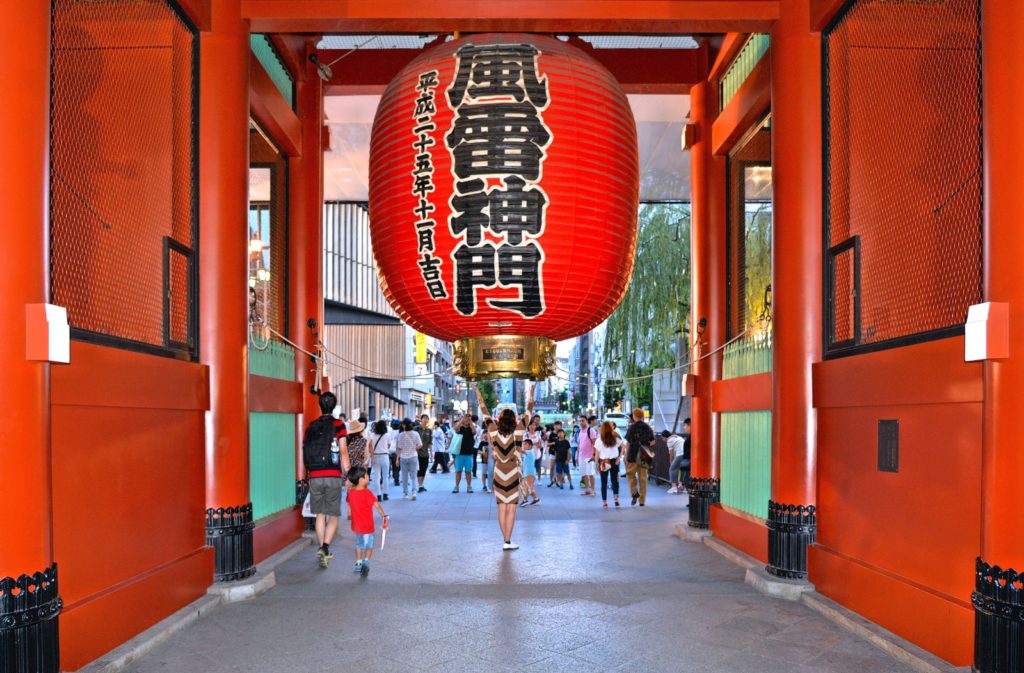
“Kaminarimon” Thunder Gate at the entrance to Senso-ji Temple.
Asakusa’s cultural history has remained intact and the area is still a shining example of Tokyo’s rich history.
The story of Asakusa begins with Senso-ji Temple, built in the 7th century. Today, this enormous and impressive Buddhist temple is still the main draw to Asakusa for both locals and tourists.
However, during the Edo period, in the shadow of Senso-ji’s holy Kaminarimon (Thunder Gate), the area grew as an entertainment district and was soon enough filled with theatres, geisha houses and all the debauchery that went with it.
Asakusa’s cultural history has remained intact and the area is still a shining example of Tokyo’s rich history.
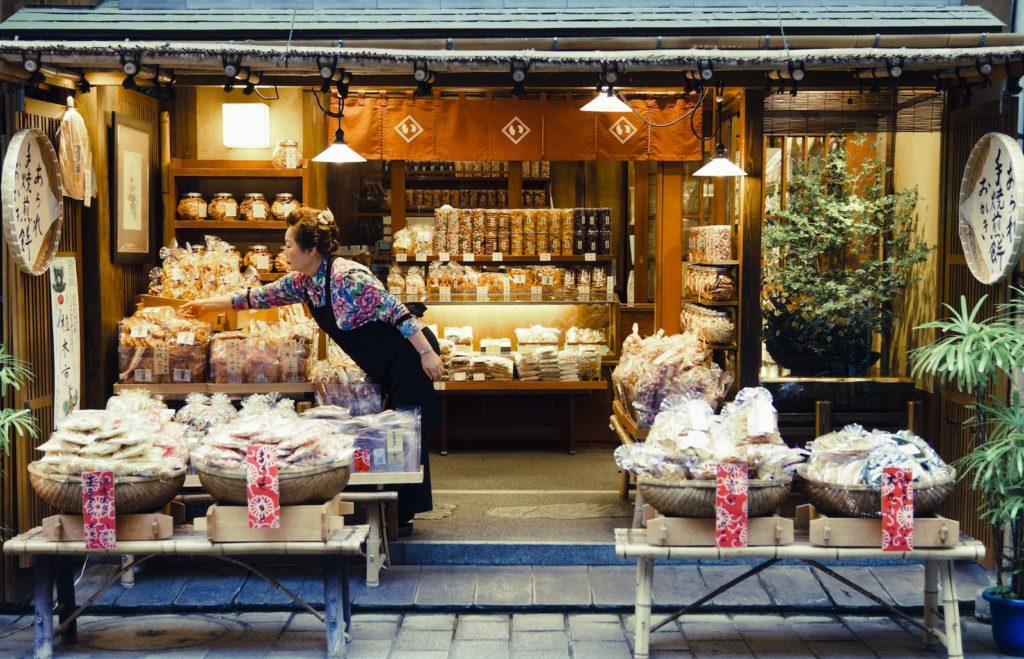
A traditional “senbei” (rice cracker store) in Asakusa.
Unfortunately, Asakusa was severely damaged by US air raids during World War II and, as a result, the entertainment of Tokyo shifted to areas like Harajuku and Shinjuku. Today, it’s the local restaurants, parks, shrines, and the central Senso-ji Temple that provide the bulk of the entertainment.
Things To Do
Senso-ji Temple
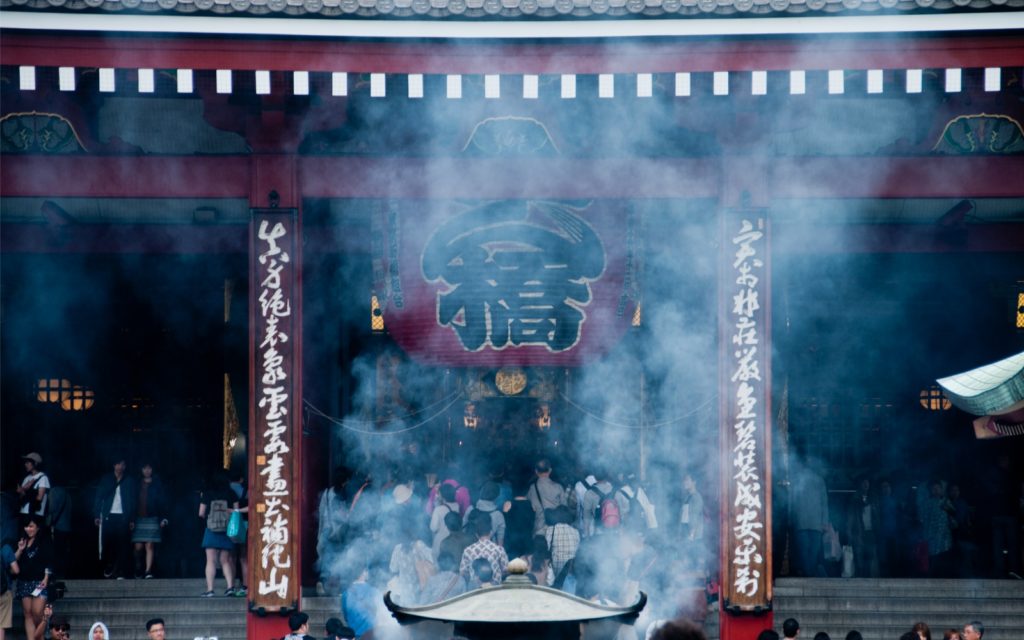
Smoke from incense rising in front of the main hall.
Senso-ji is not only the crown jewel of Asakusa but also one of the must-see tourist things to do in all of Tokyo. Senso-ji represents the vital and vibrant Buddhist history of Japan and it is also the largest temple in all of the city.
Originally built atop a hill in Asakusa in 645 CE, Senso-ji is an enormous and beautiful red Buddhist temple that features a tall pagoda, enormous gates at its entrance, and a market full of delightful traditional Japanese trinkets and souvenirs surrounding the temple.
Address: 2 Chome-3-1 Asakusa, Taito City, Tokyo 111-0032, Japan — Map
Tokyo Skytree
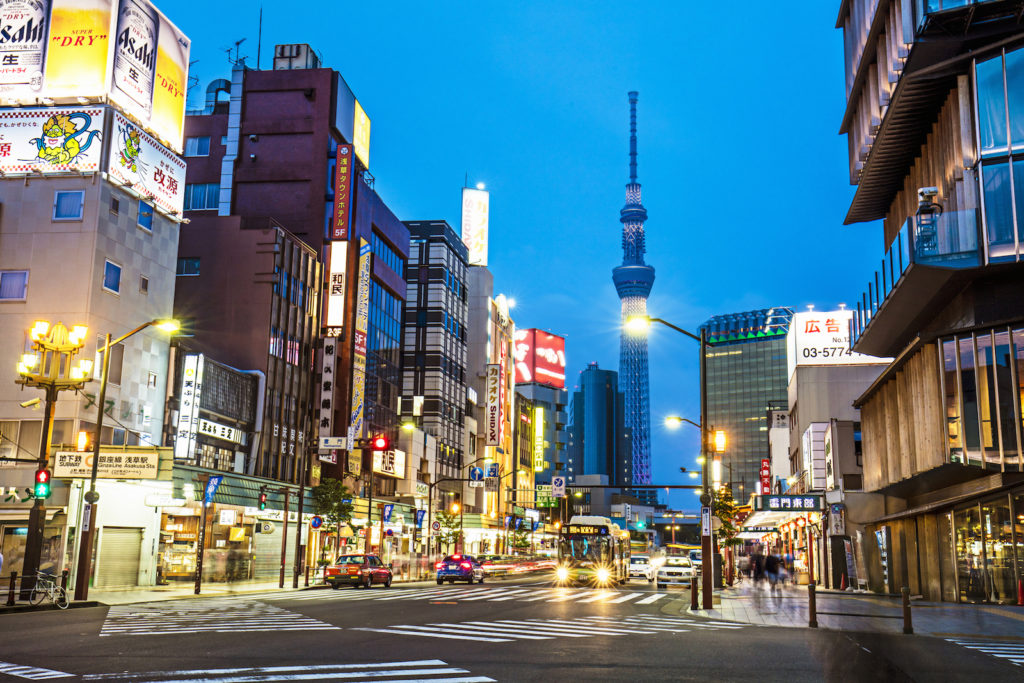
Tokyo Skytree in the near distance. The Asakusa Culture Tourist Information Center is on the right.
The tallest structure in all of Japan can be found just across the river from Senso-ji. This juxtaposition of the modern and the ancient truly encapsulates Japanese society today. Tokyo Skytree is a broadcast tower but it also serves as the most popular viewing platform in the city. From atop Skytree, visitors can get a panoramic view of Tokyo as the city spreads far into the distance. The view truly demonstrates the dizzying size of one of the biggest cities in the world.
Address: 1 Chome-1-2 Oshiage, Sumida City, Tokyo 131-0045, Japan —Map
Asahi Beer Hall
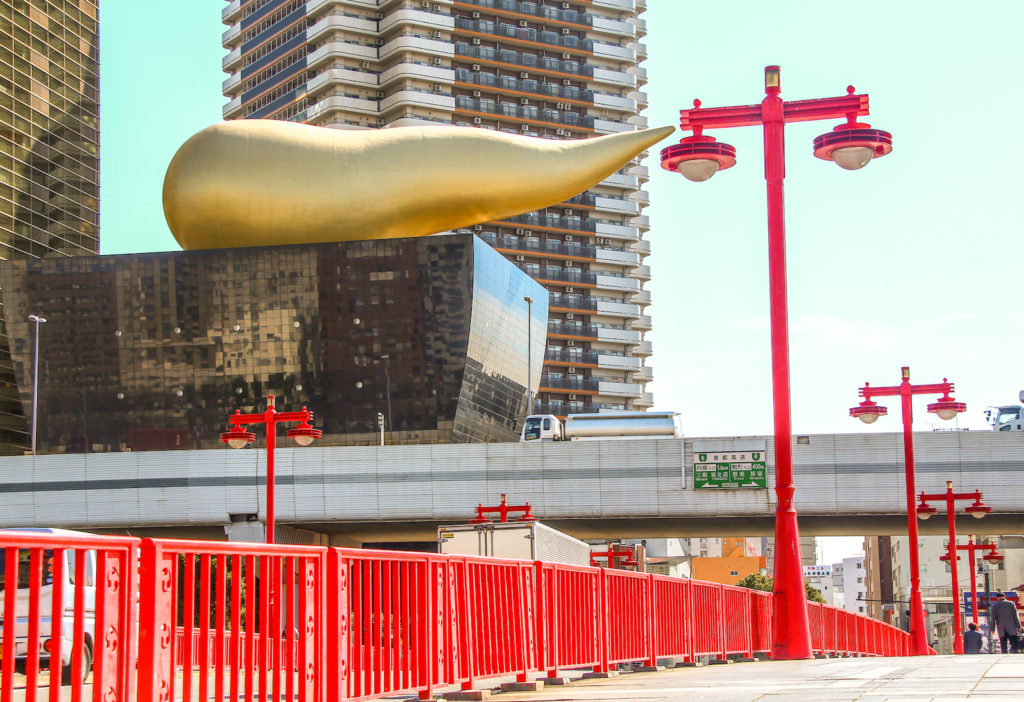
Definitely looks like a poop.
One of the most iconic and recognizable buildings in Tokyo is also the headquarters of one of its biggest brands: Asahi Beer. What’s really iconic about it is the enormous and slightly strange golden sculpture that sits atop the beer hall. Officially known as the Asahi Flame, but affectionately dubbed the “Golden Poop,” this eye-catching sculpture represents the head on a cool glass of beer.
Address: Asahi Beer Hall: 1 Chome-23-1 Azumabashi, Sumida City, Tokyo 130-0001, Japan —Map
Hanayashiki Amusement Park
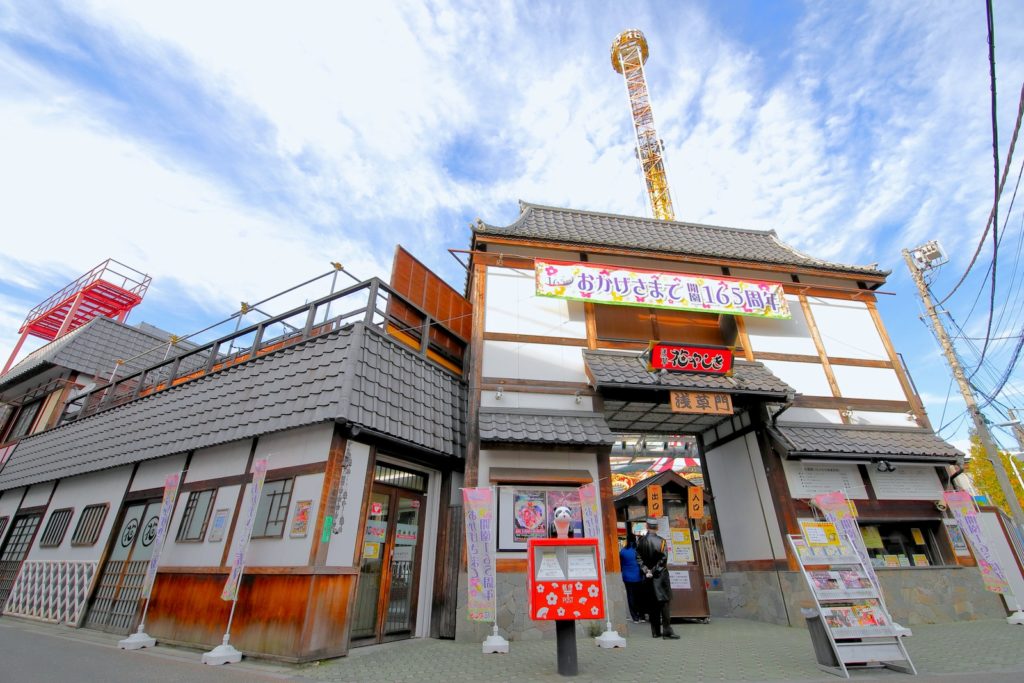
The retro entrance to Hanayashiki Amusement Park.
Owned by Bandai Namco and in operation since way back in 1853, Hanayashiki is the oldest amusement park in Japan and it is found near to Senso-ji Temple. The park features lots of traditional dining experiences as well as shops that sell ninja-related items. It even offers a 45-minute ninja training class. Hanayashiki is famous for its panda cars, which can be driven around the park by anyone.
Address: 2 Chome-28-1 Asakusa, Taito City, Tokyo 111-0032, Japan —Map
Asakusa Shrine
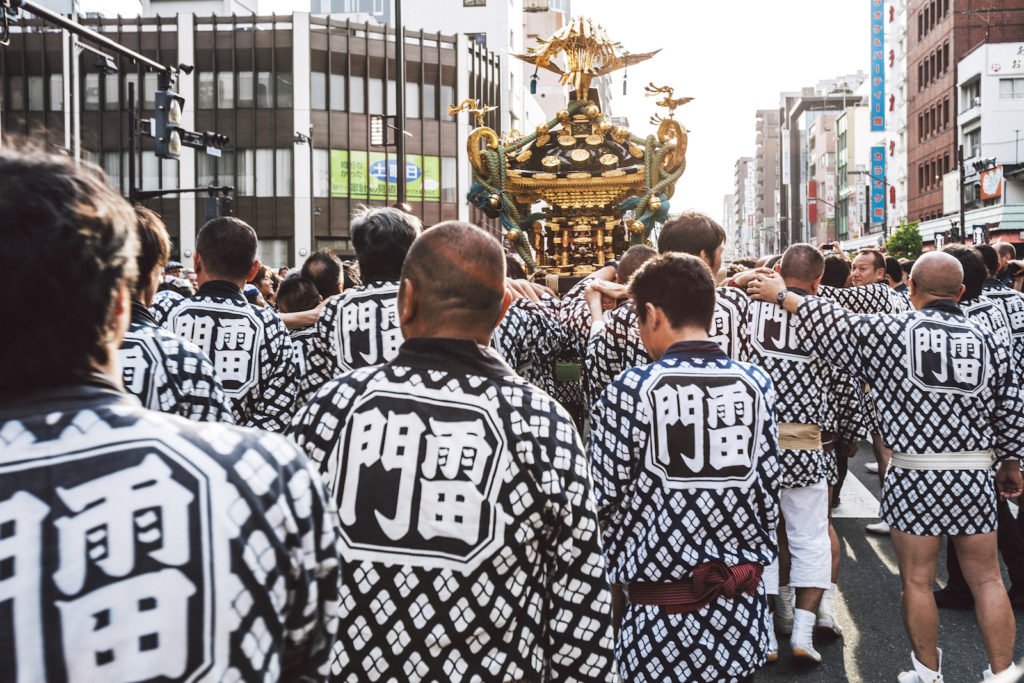
Participants at the Sanja Matsuri carry the “mikoshi” (portable shrine) through the streets of Asakusa in what’s considered Tokyo’s wildest festival.
Asakusa Shrine is connected to Senso-ji in a curious way. It is a Shinto shrine dedicated to the three men who founded Senso-ji, even though that temple is now Buddhist. A large stone torii functions as the gateway into the shrine and, though it’s small, it’s is one of the most cherished and famous in all of Tokyo. Also known as Sanja Sama, it’s one of the focal points of the raucous Sanja Matsuri, celebrating the three founders of Senso-ji and considered one of the three greatest Shinto festivals of Japan.
Address: 2 Chome-3-1 Asakusa, Taito City, Tokyo 111-0032, Japan —Map
Sumida Park
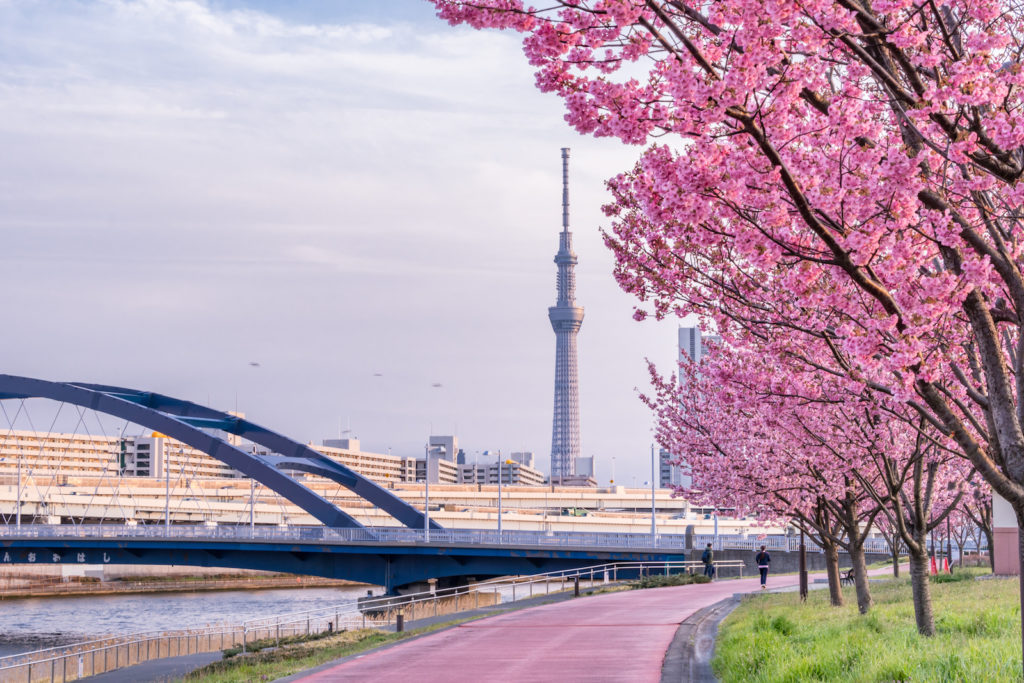
Sumida Park during spring.
Sumida Park is famous as a place to enjoy sakura (cherry blossom) in Tokyo in the springtime. It’s also a place at the edge of the Sumida River where you can enjoy a river cruise. In the summer, there’s the Sumidagawa Firework Festival. Stretching along the riverbank, this is a fantastic park to stroll through all year round.
Address: 1 Chome-2-5 Mukojima, Sumida City, Tokyo 131-0033, Japan —Map
Where to Shop
Nakamise Shopping Street
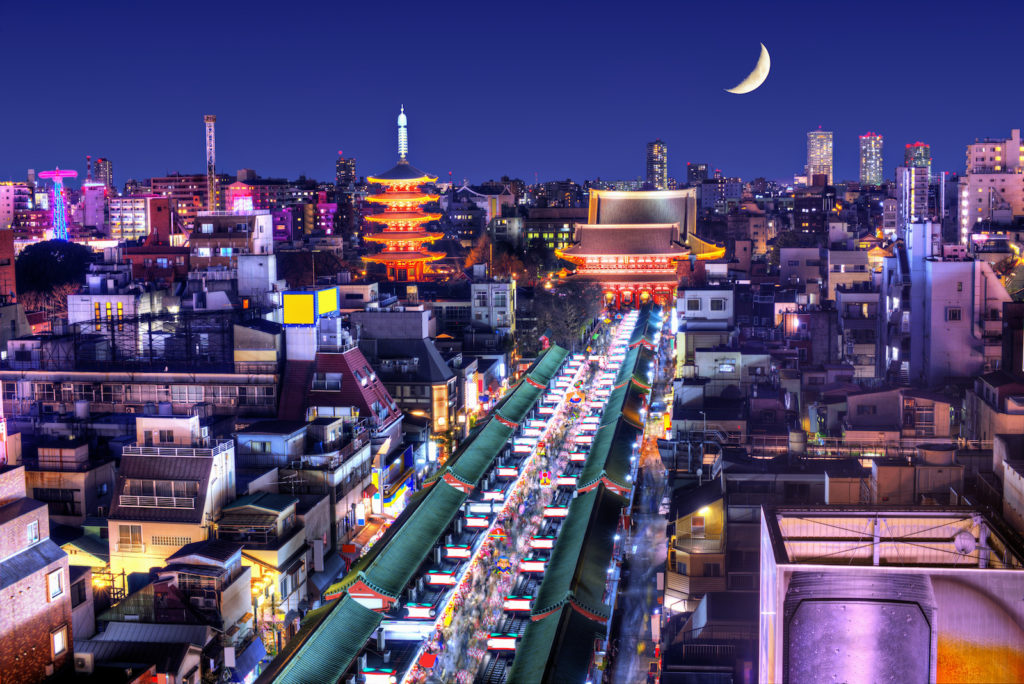
Nakamise shopping street leading to Senso-ji at night.
Nakamise is a bustling and vibrant shopping street that reaches from the main gate of Senso-ji Temple to its main hall. Lining the street are stalls selling all sorts of souvenirs, traditional Japanese foods, snacks, teas, household items, and clothing such as kimonos and obi. It’s the best street to visit for tourists wanting to pick up traditional Japanese souvenirs.
Address: 1 Chome-20 Asakusa, Taito City, Tokyo 111-0032, Japan —Map
Nishi Sando Shopping Street
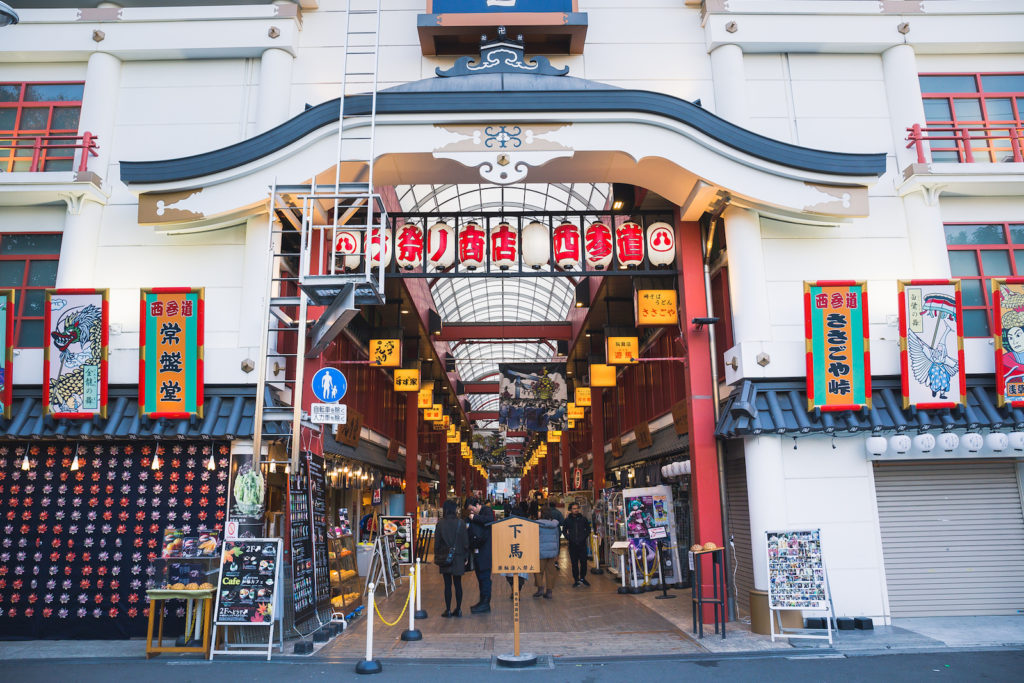
The entrance to Nishi Sando shopping street.
Located a short walk from Senso-ji and inside a beautiful traditional building is Tokyo’s most unique shopping arcade. Nishi Sando is lined with cypress flooring, providing a homely vibe, and its shops sell valuable Japanese antiques, hand-crafted traditional swords, and even weapons. There is also a divine ramen restaurant inside.
Address: 2 Chome-7-13 Asakusa, Taito City, Tokyo 111-0032, Japan —Map
Ekimise
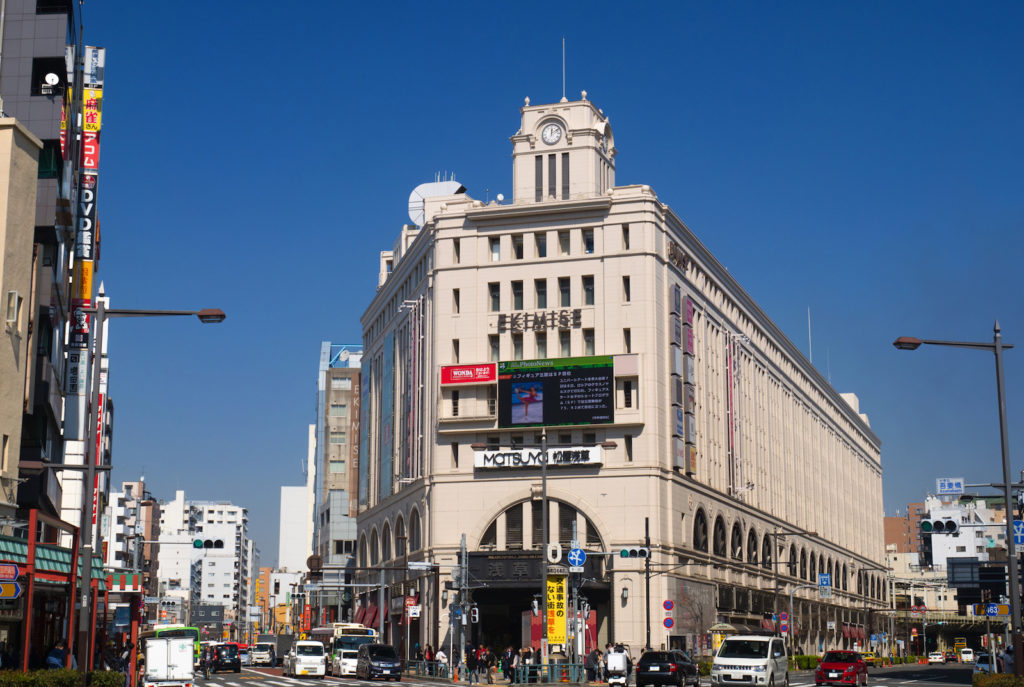
Ekimise shopping mall.
While Nakamise and Nishi Sando are very traditional, Ekimise is a modern shopping mall that focuses on craft shops and high fashion. Atop the shopping mall is a beer garden roof terrace that offers seasonal beers. You’ll also find electronics, cosmetics, a bookshop—pretty much everything you’d expect from a big shopping mall.
Address: 1 Chome-4-1 Hanakawado, Taito City, Tokyo 111-0033, Japan —Map
Isetatsu
View this post on Instagram
Established in 1864 and still managed by its founding family, this small craft store in Yanaka is the epitome of a local family business. At Isetatsu you’ll find chiyogami decorative paper, highly valued washi paper used for arts and crafts in Japan. The family who has owned the shop for five generations boasts an incredible history stretching back to the Edo period.
Address: 2 Chome-18-9 Yanaka, Taito City, Tokyo 111-0042, Japan —Map
Tenugui Fujiya
View this post on Instagram
This Asakusa shop sells gorgeous handkerchiefs and other items in various vibrant colors which change with the seasons, giving you a reason to go back and pick up more! These finely crafted and original pieces make for a unique and special gift.
Address: 2 Chome-2-15 Asakusa, Taito City, Tokyo 111-0032, Japan —Map
Where to Eat
Nakamise Shopping Street
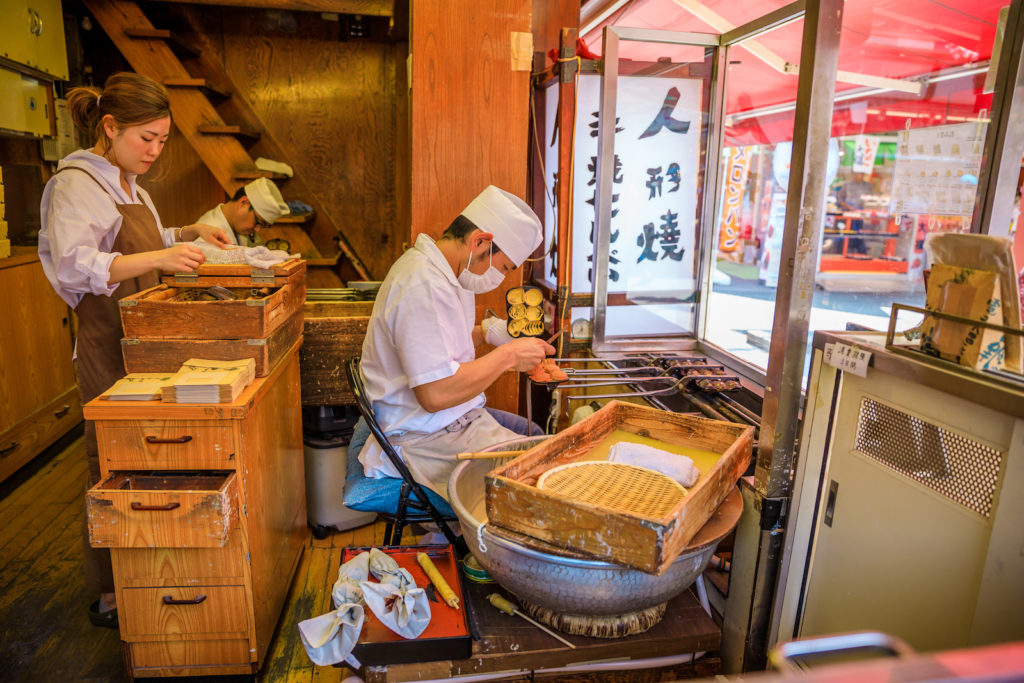
Making “taiyaki” along Nakamise street.
While already mentioned on the list of where to shop in Asakusa, Nakamise also has a ton of street foods to try. Here, you’ll find snacks like taiyaki (fish-shaped sweet pastries), takoyaki (ball-shaped dumplings with octopus inside), yakitori (meat skewers) and various flavors of mochi (sticky rice cakes). Stroll around the stalls and window shop while munching on a few of these delights.
Shokudo Unsuke
View this post on Instagram
This is an utterly delightful little Japanese curry restaurant in the heart of Asakusa. With bookcases, wall art, and a lot of wooden furniture, it has a homely and welcoming vibe that’s reinforced by how intimate and quiet it is. Shokudo Unsuke is a fantastic little spot to enjoy one of the best meals in Tokyo.
Address: 4 Chome-17-3 Asakusa, Taito City, Tokyo 111-0032, Japan —Map
Onigiri Yadoroku
View this post on Instagram
This is the oldest onigiri (rice ball) specialist restaurant in all of Tokyo, and it’s found right behind Senso-ji Temple. This onigiri shop has been selling onigiri since 1954 and makes all of its onigiris with locally sourced seaweed. There are a few seasonal fillings and ingredients are sourced from across Japan.
Address: 3 Chome-9-10 Asakusa, Taito City, Tokyo 111-0032, Japan —Map
Vegan Store
View this post on Instagram
This very new convenience store is a godsend for vegans in Japan. Plus, it also supplies some gluten-free options too. Being a vegan in Japan can be surprisingly complex and stressful, so having a simple convenience store like this one is a real dream come true.
Address: 2 Chome-25-9 Nishiasakusa, Taito City, Tokyo 111-0035, Japan —Map
Suzukien
View this post on Instagram
Reportedly the “richest matcha gelato in the world,” Suzukien is famous for their matcha gelato, which is available in a massive range of seven different intensity levels, meaning that anyone from a matcha fanatic to someone who has never tried it before can all still enjoy their gelato exactly how they want it.
Address: 3 Chome-4-3 Asakusa, Taito City, Tokyo 111-0032, Japan —Map
Café Tsumuguri
View this post on Instagram
This is a calm teahouse-style cafe that’s quite hidden away and, as such, is a great choice of cafe for visitors to escape the often intense hustle and bustle of exploring Asakusa. This cafe even offers fruit sandwiches, which are a local favorite often seen on shelves at convenience stores.
Address: 5 Chome-26-8 Asakusa, Taito City, Tokyo 111-0032, Japan —Map
Getting There
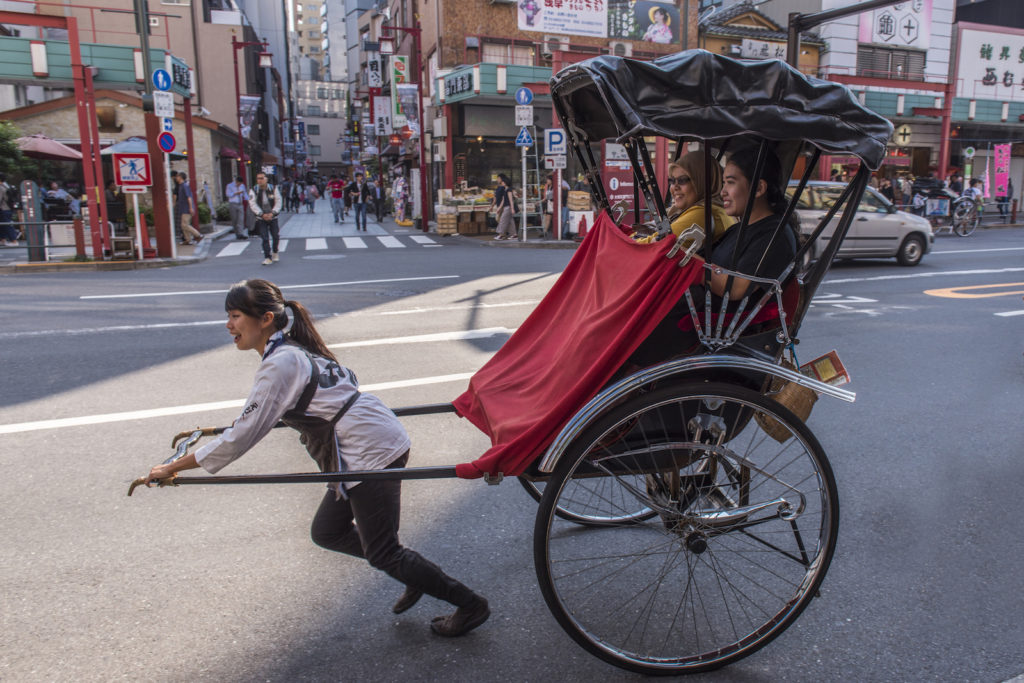
A female rickshaw driver pulling tourists around Asakusa. Now that’s what you call a workout.
You can reach Asakusa on the Yamanote line from stations like Tokyo Station, Shinjuku or Shibuya Station by transferring at Kanda station to the Ginza Subway Line. The Toei Asakusa Line is the other subway line that stops here.
Overground train lines that stop at Asakusa are the Tobu Skytree Line and the Tsukuba Express.

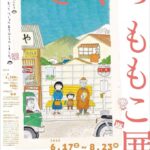
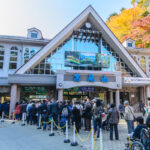
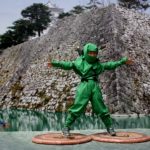

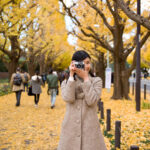






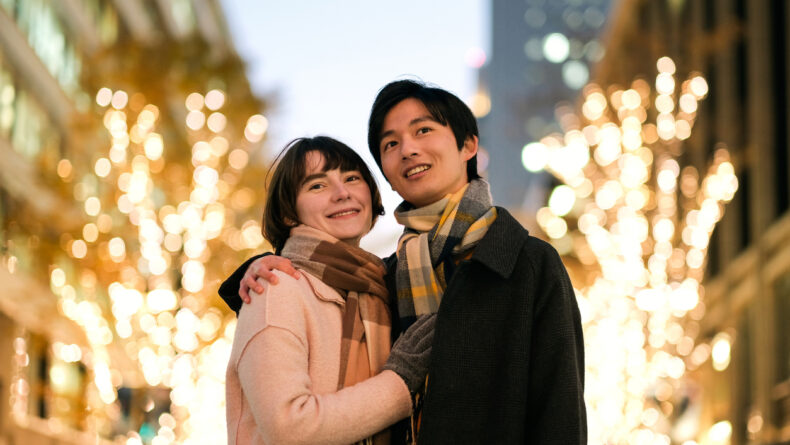
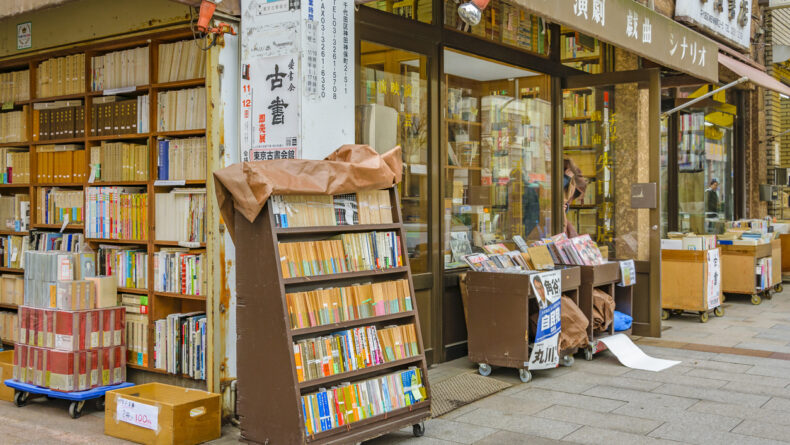

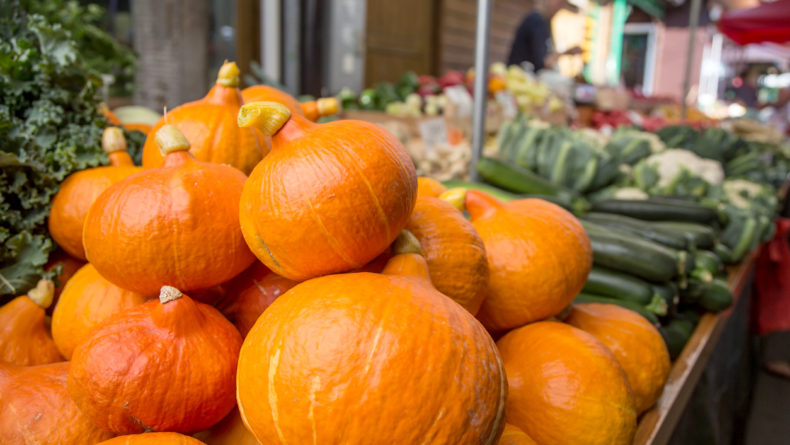
Leave a Reply